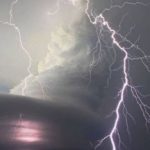 NATIONAL LIGHTNING SAFETY AWARENESS WEEK
NATIONAL LIGHTNING SAFETY AWARENESS WEEK
June 21-27, 2020
The National Weather Service, Wyoming Office of Homeland Security, and emergency management agencies across central and western Wyoming, ask your help in providing the public with information about lightning safety.
Since 1959, Wyoming has been typically in the top five in the nation per capita population involving lightning injuries and fatalities. Advance planning and increased awareness will help residents and visitors to Wyoming, be aware of the dangers of lightning. Throughout the week, the National Weather Service, Wyoming Office of Homeland Security, county emergency management agencies and other supporting groups will provide lightning safety information to help educate people to mitigate the loss of life and injuries that can happen involving lightning. Each day of the week will be a focus on a specific aspect of lightning safety.
Sunday, June 21st, begins Lightning Safety Awareness week with an initial introduction to lightning and lightning safety. Monday, June 22nd details a discussion about the science of lightning and thunder. Tuesday, June 23rd, is about lightning safety when outdoors. Wednesday, June 24th will be about lightning safety indoors. On Thursday, June 25th, lightning safety involving sports activities will be highlighted. Friday, June 26th will be about the medical effects involving lightning victims, and Saturday, June 27th will conclude lightning safety awareness week with a look at protecting your home from lightning.
Lightning is always known as one of the underrated killers. All thunderstorms have lightning and this hazard can be deceptively deadly. It is important to remember this motto, “When Thunder Roars, Go Indoors”. If outdoors and in higher elevations and you hear thunder, you could be struck by lightning. You are in the danger zone. You can audibly hear thunder up to 10 miles in any direction from your location. It is important if outdoors to get low to avoid being struck by lightning. If a thunderstorm is approaching or developing, avoid mountain tops and ridgelines, cliffs and rocky overhangs, wide open areas including lakes, creeks and boggy ground and tall, isolated trees. Remember, lightning will strike the tallest object!




